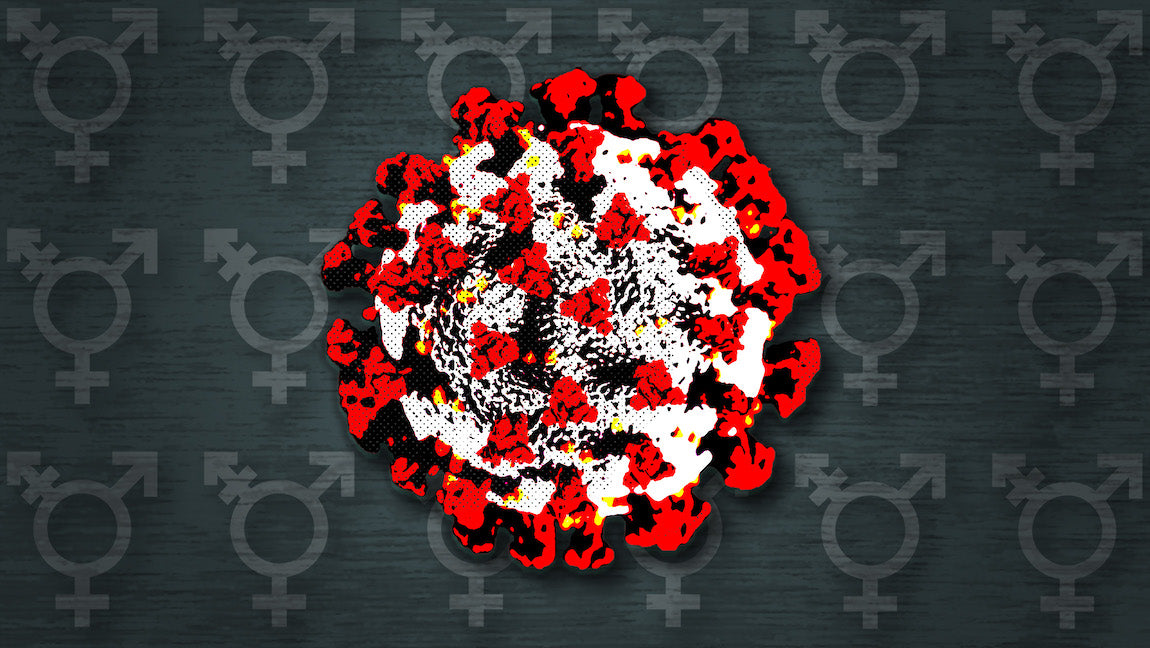The Trans And Non-binary Community And COVID-19

By Ashley Altadonna
It is an understatement to say that the novel coronavirus has fundamentally changed our lives. Millions in the U.S. and across the world have contracted the virus, and hundreds of thousands have died. Since the crisis started, we have radically altered how we live, work, play, and interact with our environments, our society, and even our loved ones. While COVID-19 has touched all of our lives in one way or another, many trans and non-binary folks have experienced increased challenges and have been particularly impacted by this disease.
Accessing Affirming Care
Before the pandemic, transgender and non-binary communities already faced obstacles in finding quality, affirming care. COVID-19 is only making this more difficult. Many who already deal with inadequate healthcare from their providers are even more fearful of seeking help. Concerns about discrimination or stigma may cause us to be reluctant about getting the testing and support we need. And at a time when the Trump administration has attempted to roll back healthcare protections for transgender Americans, it’s understandable that many of us might be wary about disclosing our gender-identities with medical providers who may wish to deny us treatment.
On average, LGBTQ+ communities continue to suffer from a poorer quality of health compared to non-LGBTQ+ communities. LGBTQ+ individuals often have higher rates of HIV and cancer. Smoking use and asthma are also greater amongst queer and trans adults than amongst non-LGBTQ+ folks. Lack of insurance also reduces the likelihood that many trans and non-binary folks will pursue care. According to a brief released in March 2020 by the Human Rights Campaign, 22% of transgender adults, and 32% of transgender adults of color, in the U.S. do not currently have health insurance. Even when we can find and afford services, they may not be as available as before the coronavirus epidemic. As hospitals and medical providers have diverted funding and resources to battle the coronavirus, access to “non-emergency” services like vital gender-affirming surgeries and hormones have been postponed or restricted.
Despite these challenges, it’s still possible to find gender-affirming healthcare even during this pandemic. Websites such as outcarehealth.org and transhealthcare.org can assist in finding an LGBTQ-friendly provider. The coronavirus has also vastly increased the availability of telehealth or “virtual doctor’s visits,” which may be preferable for those anxious at the thought of stepping into an actual doctor’s office. If you don’t have health insurance, you can learn about plans and even sign up for coverage at out2enroll.org.
Caring for Your Body During Quarantine
If you or your transgender or non-binary loved one need to self-quarantine, make sure you have an adequate supply of medications and supplies, including hormones and syringes, personal care items such as vaginal dilators and lube, make-up, binders, and packing equipment.
It’s worth noting that using a chest binder does not increase the risk of contracting COVID-19, but those who have been diagnosed should avoid binding or do so on a very limited basis. Binding can put your body at a much higher risk of complications from COVID-19, such as fluid in the lungs or pneumonia. If you feel you must bind, consider using binders that are worn-in or layering clothing. Give your body frequent breaks from the compression by removing your binder and doing some deep breathing.
Economic Disparities
The coronavirus has caused millions of Americans to lose their jobs. In April, the unemployment rate reached historic levels not seen since the Great Depression. Job and income losses often hit low-income and marginalized individuals hardest. According to a 2019 study by the UCLA Williams Institute, transgender and non-binary folks still struggle with disproportionate rates of poverty. Transgender people, and particularly trans people of color, are more than twice as likely to have lost work hours compared to the general population, and 1 in 5 are unemployed. Many LGBTQ individuals are employed in industries that have been heavily impacted by COVID-19, such as restaurants and foodservice, healthcare, K-12 education, colleges and universities, and retail. Those who have not seen their jobs eliminated or hours cut are at increased risk of exposure. Even before the pandemic many trans and non-binary folks have relied on sex work as the main source of their income. Many have had to continue to do so, despite the risks of exposure.
While the Federal Coronavirus Aid, Relief & Economic Security (CARES) Act has included several provisions to help those economically impacted by the COVID-19 pandemic, for many trans and non-binary Americans it hasn’t been enough. Thankfully, organizations like Point of Pride, the Trans Justice Funding Project, and others have stepped up to assist the financial needs of trans and non-binary folks during this difficult time. Through philanthropic donations and grassroots fundraising efforts they have created rapid-response emergency funds to support the well-being of trans and non-binary communities. Funders for LGBTQ Issues has compiled a list of funding resources. Recently, the Center for Disease Control and Prevention implemented a temporary eviction moratorium. The measure aims to help slow the spread of the COVID-19 by ensuring some 40 million renters would be able to keep their housing through the end of 2020.
Social Isolation
Social distancing and increased isolation is another aspect of the coronavirus affecting all of us. For most, this has meant visiting our friends and families less than we’d like, canceling travel or other plans, and generally staying in rather than going out. Unfortunately, quarantine measures have exacerbated the social isolation many trans and non-binary folks have already experienced from our loved ones and our communities. According to SAGE, many older LGBTQ adults are twice as likely to live alone, and four times less likely to have children. Loneliness and social isolation have been linked to serious health conditions including heart disease, dementia, depression, anxiety, and suicide. Fewer social connections may mean that access to services is more difficult for older trans and non-binary adults, particularly those not living in major cities.
Social distancing efforts have also inadvertently forced some trans and non-binary youth to be quarantined in non-affirming or even harmful environments. School closures mean that many trans and non-binary kids may lack the support and social connections that schools provide. LGBTQ youth continue to face higher rates of family rejection and homelessness. Even if your family generally accepts you, the stress of quarantine can magnify the harm of accidental misgendering.
With the release of a COVID-19 vaccine still unknown, here are some ideas of how to manage the stress of isolation, even in a hostile environment.
Be upfront with those you’re quarantining with
Everyone’s quarantine situation is unique. Trust your gut on the best way of letting others know how you’re feeling. Whether a tempered conversation or outright confrontation, you know which approach will work best for your circumstances. Consider reaching out to those who are less than accepting by sharing an informative article, book, or video. There’s no need to do the taxing work of educating others all by yourself.
Connect with friends and allies online and off
Staying connected to folks who accept and support us is more crucial than ever. Using online platforms like Zoom, Facetime, and WhatsApp or simply texting a friend can help to manage the frustrations of social isolation. There are countless free, confidential forums online dedicated to pretty much any topic you can imagine. Bonding with other like-minded folks can help us feel connected, but be aware that social media is often rife with negativity and fear-mongering. Try to strike a healthy balance of online and offline pursuits. Keep in contact through letter writing or calling a friend you haven’t spoken to in a while.
Make time and space to take care of yourself
Being confined, particularly with those who don’t accept your authentic self, can be emotionally draining. Find safe spaces and times where you can be alone and re-ground yourself. Try activities that you can do by yourself. Revisit or discover a new hobby, take a walk, exercise, learn a new language, make some art, or keep a journal. Do things that make you happy and feel better about yourself. Caring for your emotional and spiritual self is just as important as taking care of your physical self.
While the pandemic has complicated our lives, keep in mind the strength and resourcefulness that we trans and non-binary individuals each possess. We have already dealt with so many challenges, big and small. Draw on the resilience of our community, allies, and loved ones, and of course remember to stay safe and healthy.

